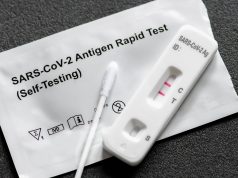High levels of plasma viral antigen linked to outcomes such as worse pulmonary status and longer time to hospital discharge
WEDNESDAY, Sept. 7, 2022 (HealthDay News) — Increased plasma viral antigen is associated with baseline severity of COVID-19 illness and with patient outcomes, according to a study published online Aug. 30 in the Annals of Internal Medicine.
Angela J. Rogers, M.D., M.P.H., from Stanford University in California, and colleagues examined whether levels of plasma antigen can predict short-term clinical outcomes, and assessed clinical and viral factors associated with plasma antigen levels among hospitalized patients with severe acute respiratory syndrome coronavirus 2. Baseline plasma antigen levels were examined for 2,540 participants enrolled in the Therapeutics for Inpatients With COVID-19 platform trial from August 2020 to November 2021.
The researchers found that 5 and 57 percent of participants had plasma antigen below the level of quantification and ≥1,000 ng/L, respectively. There was a strong association observed for baseline pulmonary severity of illness with plasma antigen level, with a 3.10-fold higher mean plasma antigen level for those requiring noninvasive ventilation or high-flow nasal cannula versus room air. Those who lacked antispike antibodies and those with the delta variant had higher plasma antigen levels (6.42- and 1.73-fold, respectively). Male sex, shorter time since hospital admission, decreased days of remdesivir, and renal impairment were also associated with a higher baseline antigen level. A plasma antigen level of ≥1,000 ng/L was associated with markedly increased odds of worsened pulmonary status at day 5 (odds ratio, 5.06) and longer time to hospital discharge (median, seven versus four days; subhazard ratio, 0.51).
“Plasma antigen is a practical and clinically meaningful biomarker for hospitalized patients with COVID-19,” the authors write.
Copyright © 2022 HealthDay. All rights reserved.








